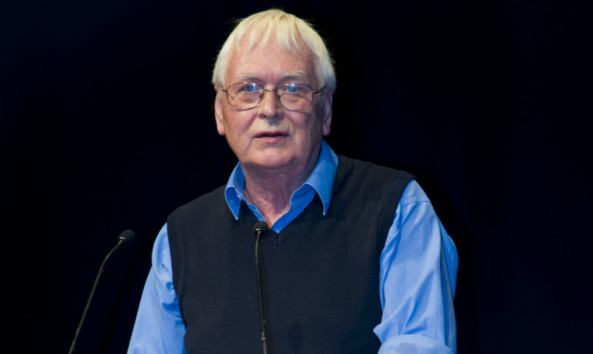Are our personal freedoms being eroded in the name of safety and national security? Helen Brown talked to Tony Bunyan of Statewatch, which monitors state activities and civil liberties in the EU.
What do people know about you? What would you rather they didn’t? And do you know whether the government or even a multi-national company has a detailed profile of you, your lifestyle and your activities?
Tony Bunyan is the founder and director of Statewatch, a non-profit-making body created in 1990 to monitor civil liberties and the state across the European Union. He is in Dundee this weekend to give a lecture as part of the Jean Monnet Summer School on the European Union’s Area of Freedom, Security & Justice. He started his professional career as an investigative journalist on Time Out, before taking a first class sociology degree and going on to specialise in justice and home affairs, civil liberties and information in the EU.
He also spent several years as the head of a political monitoring group for the Greater London Council and has written several books including The Political Police in Britain.
Former intelligence analyst Edward Snowden’s leaking of secrets opened a can of worms that few of us probably knew existed; not so much about government activities relative to spying on other, even friendly, powers, but the extent to which state surveillance and collecting of detailed personal information impinges on the lives of ordinary citizens and is available not only to governments but to other organisations and agencies around the world.
Tony Bunyan argues that we should all be personally concerned about the surveillance of our personal communications carried out or shared by state agencies and that we should be prepared to question how such data is gathered and used, whether by multi-national companies to compile profiles of our consuming and buying habits or by those in power keen to keep an eye on anyone challenging the status quo.
“There are three types of profiles, basically: the one we know about ourselves like our National Insurance number, bank account details, hospital number etc,” he says. “Then there’s what the state holds, a lot of which we’re not aware of and what multi-national companies have and increasingly those two are held in common or widely shared.
“It’s not just about what can be sold to you it could affect whether or not you get a loan or what happens when you apply for a job or promotion especially in a sensitive area. Lots of people never know why they’re turned down for a loan or are rejected for a new job.
“Putting a silly picture on Facebook can now come back to haunt you.”
Surveillance is not a new phenomenon. Tony points out: “Mail has been intercepted since the 16th century but, since September 11, 2001 it has come to be widely accepted that we live in a ‘surveillance society’.
“Post-war Britain and the US came to an agreement on intelligence gathering and the development of technology and satellite or fibre optic communication now allows the passing of huge amounts of information, personal and public between nations.
“There’s a quote from Tony Blair about the technology surrounding DNA: ‘If it’s technologically possible, why shouldn’t we do it?’ And as technology develops, that attitude becomes more prevalent.
“I think we have to look closely at how data is gathered, used, shared and who the targets of surveillance are. It’s an overview that very few of us have at the moment but it’s one that could affect all our lives.”
And is there anything we can do as individuals? “People can be aware of what traces they are leaving and think about whether they are happy for the state and multi-nationals to know about them.
“A lot of people think: ‘What does this mean to me?’ but I think we also have a duty to think about what’s being done in our name and what’s being done to other people.
“If we want to live in a free, open, democratic society, we should care about those things. Checks and balances are vital and though it’s not popular at the moment, that is one of the great roles of the media, both the traditional press and social media calling to account and asking difficult questions.
“To be honest, although it’s embarrassing when it’s revealed that Angela Merkel’s phone is being tapped, we take that as read and almost expect governments to spy on the leaders and governments of other nations.
“We shouldn’t be happy about the bugging of other Prime Ministers but where it hits home is when it affects ordinary people. Of course, it’s acceptable to use information and hard evidence to pinpoint people who are guilty of crimes or terrorism but so many drawn into this web turn out to be innocent or just protesters who have a perfect right to do so.
“One case I know of is of a perfectly peaceful, genuine local activist in the south of England, working against the export of live animals, who found out there was an official document he knew nothing about detailing his activities, meetings and movements.
“It’s important to balance safety and freedom but at the moment the balance has tipped considerably away from the latter and there comes a time to say it’s gone too far.
“In America, there has been a reaction, open debate about freedom and the curtailing of certain powers. So far, we haven’t had that here or much in Europe. Here, the introduction of ID cards was scrapped but I can’t say that we’ve pushed back many boundaries so far.
“I don’t think we’ve yet learned, as we’ve seen in the results of the recent European elections, the lessons of being open and democratic.”
Tony Bunyan presents Spying on us all: Snowden, UK-GCHQ and USA-NSA at the D’Arcy Thompson Lecture Theatre in the Tower Building of Dundee University at 6pm this Saturday. Free tickets from
http://bit.ly/uod-huma-spy
.
